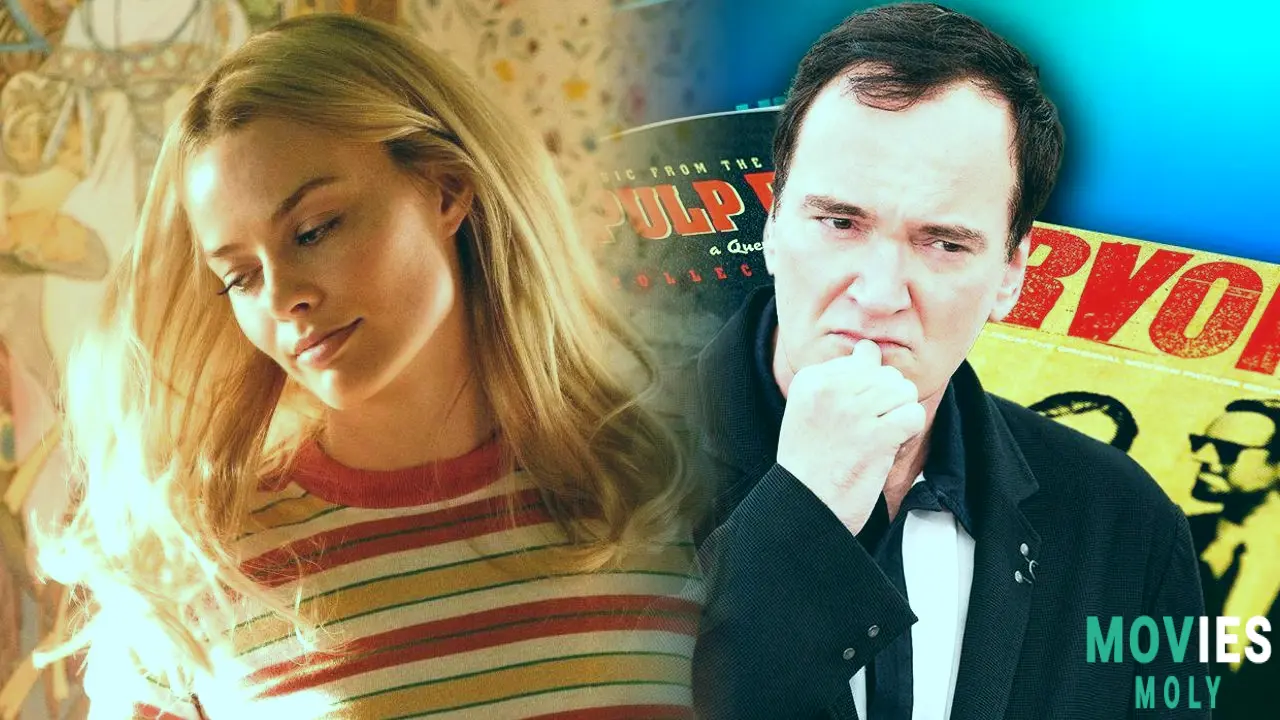If you try to name any of Quentin Tarantino's nine films, it will be difficult to determine who the finest character is. Sure, Hans Landa definitely wins Inglourious Basterds with little competition, but same sentiment applies to the majority of his other films as well. And it is these characters—the Landas, Vegas, Candies, Winnfields, and Booths—that Tarantino wants people to remember him for. He hopes that these creations will remain with viewers long after he finishes making films.
Tarantino recently spoke at the Cannes Film Festival, where he had the privilege of opening, and revealed that he is less concerned with his entire film being remembered for years. Instead, he hopes that his characters remain memorable. He said he is most proud of his character creations. "When I leave this earthly coil, I hope that my characters will be remembered as the most memorable aspect of my films. The scenarios are rather simple.These are genre films.They are essentially genre settings that I twist and bend in a variety of ways. But the characters..."I hope the characters I created live on."
This method of thinking makes a lot of sense given how many great characters occupy his film worlds. From the sharp-witted Jules Winnfield in Pulp Fiction to the quiet but rugged Cliff Booth in Once Upon a Time in Hollywood, his characters frequently feel more genuine and permanent than the situations they appear in. They have distinctive voices and memorable sentences. They form the heart of his films. They are commonly quoted and remembered long after the film has ended.
Quentin Tarantino discusses how his films and methods have inspired other filmmakers.How He Sees The Numerous "Rip-Off" Films As A Compliment And A Sign of His Impact
The only minor issue with Tarantino's ability to write such compelling characters is the wave of directors who attempted to emulate his style in the 1990s and 2000s. We're discussing films like Grosse Pointe Blank, Things to Do in Denver When You're Dead, and 2 Days in the Valley. There were plenty others. While the influx of comparable films can be overwhelming at times, Tarantino views the majority of it as a show of appreciation. He sees it as a positive thing.
"I am always thrilled. I mean, some people are sensitive about that. I like it. "It validates my efforts..." Tarantino explained. He believes that even when people appear to duplicate something, it is usually because they are enthusiastic about it. "They're taking their homages or they're taking my inspiration and they're finding their own way but they want to take along with them what they like." He cited directors like Brian De Palma and Sergio Leone as two of his personal influences. He has already been accused of drawing from these directors. He emphasized that he, like those men, is making his own mark on film history.
Tarantino is also quite forthcoming about his influences. This is part of the reason his films feel so rich. He combines genres, draws from older films, and adds his own perspective. He makes something new and familiar at the same time. I admire his willingness to discuss his creative process and what inspires him. It provides us a greater idea of how he creates his own film universes. This also demonstrates that his approach to filming is a genuine reflection of his passion for cinema.
It's refreshing to see a director so sure in his vision that he encourages people to be inspired by it. He sees it as a continuation of a film conversation, rather than stealing. This is indicative of a director who has a thorough understanding of film history. He understands that every artist builds on what came before them. His demeanor makes him even more compelling to follow.
Exploring Quentin Tarantino's Unique Way Of Telling Stories From Different Perspectives

How films like Jackie Brown and Reservoir Dogs master the Rashomon effect
One of Quentin Tarantino's most intriguing films, Jackie Brown, demonstrated a filmmaking technique he initially utilized in Reservoir Dogs. This strategy is known as the Rashomon Effect. It takes its name from a 1950 Akira Kurosawa film. In Kurosawa's film, a murder occurred. Four witnesses tell their stories on what transpired. This allows the spectator to compare and contrast the accounts and determine the truth.
Reservoir Dogs employed a variation of this concept. It depicted a bungled robbery from multiple characters' perspectives. This progressively revealed what had happened. Tarantino later improved on this strategy in his crime film Jackie Brown. This film is often forgotten. The Rashomon Effect entails telling a story from various points of view. Most of the characters in these stories are not entirely honest. This concept appears in numerous films, television series, and books. It even appears in legal contexts. The key objective is to demonstrate how people perceive things differently. Sometimes it's on intention, sometimes not.
Tarantino has used non-linear storytelling in many of his films. In Reservoir Dogs, he exploited it to have audiences question all of the criminals. Nobody knew who had deceived them till the very end. In Pulp Fiction, he exploited it to tell a more original story. Here, it was more about how the tale was told. But in Jackie Brown, Tarantino truly mastered the technique. He employed it in the same way Kurosawa had before him. In both Rashomon and Jackie Brown, a crime occurs. Viewers perceive it from the perspective of a single character. The film then revisits the scene from the perspective of another character. By the conclusion, viewers have witnessed the same crime from multiple perspectives. They must then choose which character they believe the most in. It's simple to see things from Jackie Brown's perspective. She's the most compassionate character. However, she is just as unreliable as the others. It provided for a fascinating viewing experience.
Why Jackie Brown Remains One Of Quentin Tarantino's Best But Often Unseen Films.

Looking Back on a Film That Deserves More Attention From Film Lovers And Fans
Jackie Brown is based on Elmore Leonard's book Rum Punch. It exists in the same world as films such as Out of Sight. Michael Keaton plays the same character in both films. However, as a Tarantino film, there was no actual connection to Out of Sight other than the character. It was not promoted in that manner either. Because of this, the film had to stand on its own as a Quentin Tarantino production. Many fans made unwarranted comparisons to Pulp Fiction.
The film received a lot of positive reviews. It received an 88% fresh score on Rotten Tomatoes. However, viewers were not as enthusiastic. It grossed only $74.7 million at the movie office. Pulp Fiction grossed $213.9 million. Despite Tarantino's low-budget production, both films were box office successes. But this limited the number of individuals who saw Jackie Brown. When Kill Bill debuted and became a huge success, many people seemed to forget about it. Michael Keaton was upset with this. He called Jackie Brown a fantastic film.
That is sad. Pam Grier was excellent in Jackie Brown. All of the supporting actors had strong performances. Robert Forster led them. The picture helped him make a little return in his career. He even received an Oscar nomination. Samuel L. Jackson Robert De Niro and Bridget Fonda all delivered outstanding performances in their parts. The Rashomon Effect worked brilliantly here. Jackie Brown deserves to be recognized as a more significant film in Quentin Tarantino's career. It is a masterful plot that is consistent with everything else the filmmaker has produced over the years.
The Future Of Quentin Tarantino's Film Career And His Final Story

What to expect as the acclaimed director approaches his tenth and last film
We don't know what Quentin Tarantino's tenth and final picture will be. However, it is almost certain that he will provide us with even more remarkable characters before retiring as a director. Aside from his own films, David Fincher's next film will star Cliff Booth from Once Upon a Time in Hollywood, one of his most memorable characters. This demonstrates that his character inventions extend beyond his own directing endeavors. It also highlights his long-lasting impact on film history.
Tarantino's latest interview at Cannes was a real treat for film fans. He introduced Red Canyon, a film directed by George Sherman. This demonstrated Tarantino's strong passion for film history. It also demonstrated his desire to recognize the filmmakers who have inspired him. It's interesting to see him reflecting on masters while still identifying as one himself. He also told a moving story about seeing Robert De Niro receive the Palme d'Or. This reminds us that even famous filmmakers are fans at heart.
Tarantino discussed how winning the Palme d'Or for Pulp Fiction transformed his life. He also discussed how thrilled he felt when his debut film, Reservoir Dogs, was selected for the festival. When it comes to making his own films, Tarantino sees the script as a "safety net." This allows him to experiment and be creative while filming. He knows he can count on a solid basis. He continues to emphasize the importance of his characters. He wants them to be the most memorable aspects of his movie.
This glimpse into Quentin Tarantino's mind is an engrossing look into how he produces, who influences him, and his lifelong passion for cinema. He has made a significant contribution to movies. He has given us stories and people that will be remembered for many years. It is apparent that his films will continue to captivate audiences and inspire artists for many years to come.




